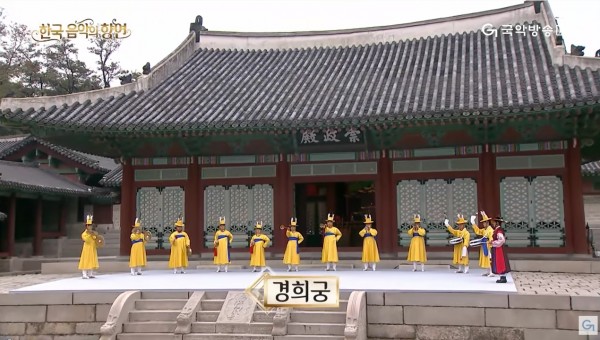한국의 전통 음악 - 대취타 (Daechwita)
도우미
본문
■ 곡 설명
대취타는 ‘크게 불고 두드린다’는 뜻으로, 왕이 궁 밖으로 거동 할 때나 군대가 행진 할 때 연주하던 행진곡이다. 커다란 소라로 만든 나각과 금속으로 만든 나발 등 한 음정만 내는 관악기와 징, 자바라, 용고와 같은 타악기가 중심이 되는데, 태평소가 가락을 연주한다. 지휘자 역할을 하는 등채의 구호에 따라 음악을 시작하고 마친다. 태평소의 자유로운 가락과 나각 및 나발의 호령하는 듯한 음색 그리고 타악기의 울림이 어우러져서 장쾌하고 드높은 기상을 나타낸다.
■ 연주: 국립국악원 정악단 / 등채: 김기동
Daechwita means ‘blow loudly and knock’, and it is a marching song played when the king moved out of the palace or the army was marching. Wind instruments with only one pitch, such as a large conch shell and metal Nabal, and percussion instruments such as gongs, bellows, and Yonggo are mainly played, with Taepyeongso playing melodies. The music starts and ends with the slogan of Deungchae acting as the conductor. The free melodies of Taepyeongso, the roaring tones of Nagak and Nabal, and the sound of percussion instruments harmonize to create a cheerful and high spirit.
✅ Join to learn more. ▶ www.elkorean.kr/bbs/register_form.php
It is a paid class with professional native Korean teachers with Zoom or Skype.
오늘도 행복하세요.
Have a happy day!
대취타는 ‘크게 불고 두드린다’는 뜻으로, 왕이 궁 밖으로 거동 할 때나 군대가 행진 할 때 연주하던 행진곡이다. 커다란 소라로 만든 나각과 금속으로 만든 나발 등 한 음정만 내는 관악기와 징, 자바라, 용고와 같은 타악기가 중심이 되는데, 태평소가 가락을 연주한다. 지휘자 역할을 하는 등채의 구호에 따라 음악을 시작하고 마친다. 태평소의 자유로운 가락과 나각 및 나발의 호령하는 듯한 음색 그리고 타악기의 울림이 어우러져서 장쾌하고 드높은 기상을 나타낸다.
■ 연주: 국립국악원 정악단 / 등채: 김기동
Daechwita means ‘blow loudly and knock’, and it is a marching song played when the king moved out of the palace or the army was marching. Wind instruments with only one pitch, such as a large conch shell and metal Nabal, and percussion instruments such as gongs, bellows, and Yonggo are mainly played, with Taepyeongso playing melodies. The music starts and ends with the slogan of Deungchae acting as the conductor. The free melodies of Taepyeongso, the roaring tones of Nagak and Nabal, and the sound of percussion instruments harmonize to create a cheerful and high spirit.
✅ Join to learn more. ▶ www.elkorean.kr/bbs/register_form.php
It is a paid class with professional native Korean teachers with Zoom or Skype.
오늘도 행복하세요.
Have a happy day!
Comments
Bill Jason
Wonderful music. I love Korean traditional music. Thanks for sharing.
James Taiho
Very traditional and wonderful music.



 Customer Support Center
Customer Support Center